【优质】小学英语译林牛津版五年级上册Unit 7 At weekends优质公开课教案1
小学英语牛津译林苏教版五年级上册(新版)Unit 7 At weekends单元教案
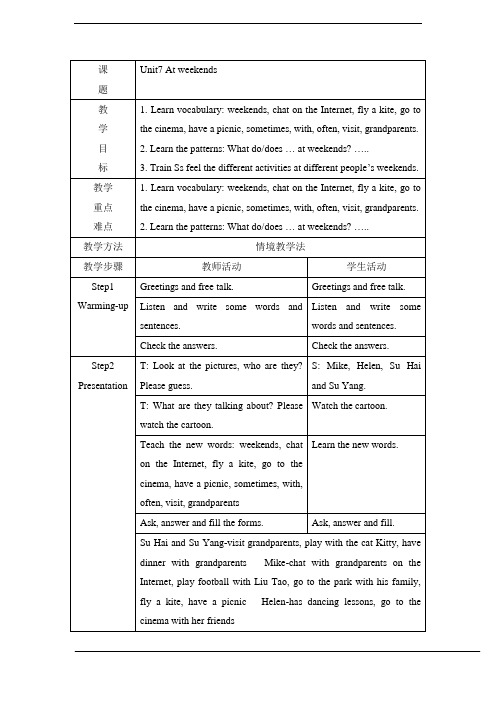
课题Unit7 At weekends教学目标1. Learn vocabulary: weekends, chat on the Internet, fly a kite, go to the cinema, have a picnic, sometimes, with, often, visit, grandparents.2. Learn the patterns: What do/does … at weekends? …..3. Train Ss feel the different activities at different people’s weekends.教学重点难点1. Learn vocabulary: weekends, chat on the Internet, fly a kite, go to the cinema, have a picnic, sometimes, with, often, visit, grandparents.2. Learn the patterns: What do/does … at weekends? …..教学方法情境教学法教学步骤教师活动学生活动Step1 Warming-up Greetings and free talk. Greetings and free talk. Listen and write some words andsentences.Listen and write somewords and sentences. Check the answers. Check the answers.Step2 Presentation T: Look at the pictures, who are they?Please guess.S: Mike, Helen, Su Haiand Su Yang.T: What are they talking about? Pleasewatch the cartoon.Watch the cartoon.Teach the new words: weekends, chaton the Internet, fly a kite, go to thecinema, have a picnic, sometimes, with,often, visit, grandparentsLearn the new words.Ask, answer and fill the forms. Ask, answer and fill.Su Hai and Su Yang-visit grandparents, play with the cat Kitty, have dinner with grandparents Mike-chat with grandparents on the Internet, play football with Liu Tao, go to the park with his family, fly a kite, have a picnic Helen-has dancing lessons, go to the cinema with her friendsTeach: What do/does … at weekends? Learn: What do/does … atweekends?Read the new vocabulary. Read the new vocabulary.Listen to the tape and notice the pronunciations and intonations. Listen to the tape and notice.Read after the tape. Read after the tape. Try to read this story. Try to read this story.Choose one kind of reading and read in groups. Choose one kind of reading and read in groups.Try to read this story. Try to read this story. Read this story together. Read this story together. Act this story. Act this story.Read in roles. Read in roles.Step3 Consolidation Make some dialogues: What do/doesXX do at weekends? XX …/s/es ….Make some dialogues:What do/does XX do atweekends? XX …/s/es ….Step4 Homework 1. Write the new vocabulary.2. Read, recite and act this story.板书设计Unit7 At weekendsSu Hai and Su Yang- visit grandparents, play with the cat Kitty, have dinner with grandparentsMike-chat with grandparents on the Internet, play football with Liu Tao, go to the park with his family, fly a kite, have a picnicHelen-has dancing lessons, go to the cinema with her friends课前准备cards, pictures, tape,recorder课后小结课题Unit7 At weekends教学目标1. Learn the vocabulary: fly-flies, go-goes2. Learn the patterns: What do/does XX do at weekends? XX sometimes/often …/s/es ….3. Learn the third person singular in the sentences.教学重点难点1. Learn the patterns: What do/does XX do at weekends? XX sometimes/often …/s/es ….2. Learn the third person singular in the sentences.教学方法操练教学法教学步骤教师活动学生活动Step1 Warming-up Greetings and free talk. Greetings and free talk. Listen and write some words Listen and write. Check the answers. Check the answers. Read and act this story. Read and act this story.Step2 Presentation Look at the pictures. Look at the pictures.Talk about the pictures and thesentences.Talk about the pictures andthe sentences.Look and write. Look and write.Check the answers: Check the answers.I usually play football with Liu Tao at weekends. I also chat with my grandparent on the Internet. I sometimes fly a kite and have a picnic with my family.Su Yang and I usually visit our grandparents at weekends. We play with their cat Kitty. We have dinner with our grandparents.I always have dancing lessons at weekends. I sometimes go to the cinema with my friends.Read and write the sentences. Read and write.Read the sentences. Read the sentences.Teach the new words :goes, flies Learn the new words.Teach the third person singular in the sentences. Learn the third person singular in the sentences.Complete the grammar. Complete the grammar.Teach the different words: always, usually, often, sometimes Learn the different words: always, usually, often, sometimesLook at the pictures and talk about the pictures and the sentences. Look at pictures and talk about them and sentences.Play a game “Ask and answer”Play a game. Check the answers. Check the answers.Step3 Consolidation Read and write the sentences. Read and write.Make some dialogues: What do/doesXX do at weekends? ….Make some dialogues.Make some sentences with the thirdperson singular.Make some sentences withthe third person singular.Step4 Homework 1. Copy and write some sentences..2. Describe the activities of the weekends.板书设计Unit7 At weekendsWhat do you do at weekends? I ….they Theydoes he He …s/es ….she She …s/es ….fly-flies go-goes课前准备cards, pictures, tape,recorder课后小结课题Unit7 At weekends教学目标1. Learn the vocabulary: rose, grow, get out.2. Learn the phonetic of the letter “s”.3. Learn the patterns: Let’s go …. He/She ……s/es ….4. Train Ss enjoy the great fun of this cartoon story.教学重点难点1. Learn the vocabulary: rose, grow, get out.2. Learn the phonetic of the letter “s”.3. Learn the patterns: Let’s go …. He/She ……s/es ….教学方法谈话教学法教学步骤教师活动学生活动Step1 Warming-up Greetings and free talk. Greetings and free talk. Listen and write some sentences. Listen and write. Check the answers. Check the answers.Step2 Presentation Look at the pictures. Look at the pictures. Listen to the tape. Listen to the tape.Find the same letter “s”. Find the same letter “s”. Say the phonetic /z/ of the letter “s”. Say the phonetic /z/. Teach the new words: rose-roses,grow-growsLearn the new words:rose-roses, grow-grows Read the short text. Read the short text.Act the short text. Act the short text.Find the other words. Find the other words.Do some exercises. Do some exercises. Check the answers: Check the answers.T: Look at the pictures, who are they? S: They’re Billy, Sam andBobby.T: What are they doing? Watch thecartoon, please.Watch the cartoon.Ask, answer and fill the forms: Ask, answer and fill.Billy-watch TV, eat a lot, don’t like playing basketball and swimming, can’t get outSam and Bobby-play basketball, go swimming, go and have a picnicListen to the tape and notice the pronunciations and intonations. Listen to the tape and notice.Teach the new word: get out Learn new word. Read after the tape. Read after the tape.Choose one kind of reading and read in groups. Choose one kind of reading and read in groups.Read this cartoon story together. Read this cartoon together. Act this cartoon story. Act this cartoon story. Teach the learning tip. Learn the tip.T: What about this cartoon story? S: ….Step3 Consolidation Make some sentences with the thirdperson singular.Make some sentences withthe third person singular.Step4 Homework 1. Write some vocabulary and patterns.2. Read, recite and act this cartoon story.板书设计Unit7 At weekendsrose-roses grow-grows get outw-/w/Let’s go …. He/She …s/es ….课前准备cards, pictures, tape,recorder课后小结课题Unit7 At weekends教学目标1. Learn the vocabulary: popular.2. Learn the different ball cultures in different countries.3. Review the vocabulary and patterns of this unit.4. Appraise the harvest of this unit.教学重点难点1. Learn the vocabulary: popular.2. Learn the different ball cultures in different countries.3. Review the vocabulary and patterns of this unit.教学方法复习教学法教学步骤教师活动学生活动Step1 Warming-up Greetings and free talk. Greetings and free talk. Do some exercises of the letter “s”. Do some exercises. Check the answers. Check the answers.Step2 Presentation Look at the pictures. Look at the pictures.Talk about the pictures. Talk about the pictures. Listen to the tape. Listen to the tape.Teach the new words: popular Learn the new words:popularRead the short text. Read the short text.Act the short text. Act the short text.Teach the different ball cultures indifferent countries.Learn the different ballcultures in differentcountries.Look at the pictures. Look at the pictures.Talk about the pictures and sentences. Talk about the pictures andsentences.Ask, choose and say. Ask, choose and say. Check the answers. Check the answers.Look at the pictures. Look at the pictures.Talk about the pictures and sentences. Talk about the pictures andsentences.Think and write. Think and write.Check the answers: Check the answers.I usually do homework at weekends. I often play football. I sometimes watch TV. My friend XX always does homework at weekends. He/She usually has skating lessons. He/She sometimes goes to the cinema.Read and write the sentences. Read and write.Review this unit. Review this unit.Say the rules of it. Say the rules of it. Appraise the harvest of this unit. Appraise the harvest. Total the stars. Total the stars.Step3 Consolidation Make some dialogues: This is myfriend. He/She ……s/es ….Make some dialoguesStep4 Homework 1. Recite the vocabulary and patterns.2. Finish the workbooks.板书设计Unit7 At weekends Basketball is popular in the US.Football is popular in the UK.Table tennis is popular in China.课前准备cards, pictures, tape,recorder课后小结。
牛津译林版小学英语五年级上册Unit7 At weekends Period3

Hello, boys and girls.
My English name is Cherry.
I am your new English teacher.
At weekends, I always study English in the study.
I often surf the Internet(上网)at home.
S开头的单词,s发 /s/
surf sing
swim
skate
Listen and answer.
What does Mr Rose do at weekends?
He grows roses. He shows us his roses.
Read and find.(读一读,你发现s发什么音?)
1. Read in roles. (分角色朗读) 2. Do the dubbing.(给故事配音)
…
Cartoon time.
Tip: Retell the story. (复述故事)
动词 1.用第三人称复述,在复述时要注意
第三
人称单数的变化。
板书 图片 2.借助
或
进行复述。
Cartoon time: Retell the story.
409、:0敏17而.1好2.学20,20不09耻:0下17问.1。2.。2072.1020.92:021079.:1021.:2405270.1029.:200120090:091:00197:0.112:4.2500290:01:45
这醉人芬春芳去的春季又节回,,愿新你桃生换活旧像符春。天在一那样桃阳花光盛,开心的情地像方桃,在 54、海不内要存为知它已的,结天束涯而若哭比,邻应。当为Su它nd的ay开, J始u而ly 笑12。, 270.2102J.2u0ly20270.S1u2n.2d0a2y0, 0J9u:l0y11029,:200120097:0/12:4/250290:01:45 花一这样醉美人丽芬,芳感的谢季你节的,阅愿读你。生活像春天一样阳光,心情像桃 65莫、愁生前命路的无成知长已,,需天要下吃谁饭人,不还识需君要。吃苦9时,1吃分亏9时。1S分un1d2a-Jyu,lJ-2u0ly71.122,.2020July 20Sunday, July 12, 20207/12/2020
最新译林牛津版小学英语五年级上册《Unit7Atweekends》谈论周末常用的英文语句

谈论周末常用的英文语句
如果你想问朋友的周末打算,可以这样说:
What are you doing this weekend?
你周末干嘛?
Do you have anything going on this weekend?
周末有什么活动?
Do you have any big plans for the weekend?
周末有啥计划吗?
Do you have anything planned for this weekend?
周末计划干啥?
如果你已经有计划了,可以这样回答:
I'm driving to Baltimore with a friend.
我和朋友开车去巴尔的摩。
I've got a date lined up.
我有个约会。
John and I are taking the kids to the zoo.
约翰和我要带孩子去动物园。
如果没有计划,不如这样回复:
I don't have anything planned.
我没啥计划。
I'll probably just stay at home and relax.
我大概就窝在家里,放松一下。
I just want to sleep in!
我就想睡个懒觉!
当然,也许你并不打算打听他人的周末计划,那么就祝他们周末愉快吧:Enjoy your weekend!
好好享受周末!
Have a great weekend! 周末愉快!。
译林版小学五年级英语上册第7单元Unit7 At weekends课文翻译

译林版小学五年级英语上册第7单元Unit7 At weekends课文翻译Story time故事时间翻译Mike: What do you do at weekends, Su Hai?迈克:在周末你做什么,苏海?Su Hai: I usually visit my grandparents. Su Yang and I like playing with their cat Kitty very much. We often have dinner with our grandparents at weekends.苏海:我通常去看望我的祖父母。
杨栗和我非常喜欢和他们的猫凯蒂一起玩。
周末我们经常和爷爷奶奶一起吃饭。
Mike: My grandparents live in the UK. I usually chat with them on the Internet at weekends.迈克:我的祖父母住在英国。
我通常在周末和他们在网上聊天。
Su Hai: What does Helen do at weekends?苏海:在周末海伦做什么?Mike: She always has dancing lessons. She sometimes goes to the cinema with her friends.迈克:她总是上舞蹈课。
她有时和朋友去看电影。
Su Hai: What about you, Mike?苏海:你呢,迈克?Mike: I usually play football with Liu Tao at weekends.I sometimes go to the park with my family. We usually fly a kite and have a picnic there.迈克:我通常在周末和刘涛一起踢足球。
我有时和家人去公园。
我们通常在那里放风筝和野餐。
小学的英语译林牛津版五年级的上册《Unit7Atweekends》教案第二课时
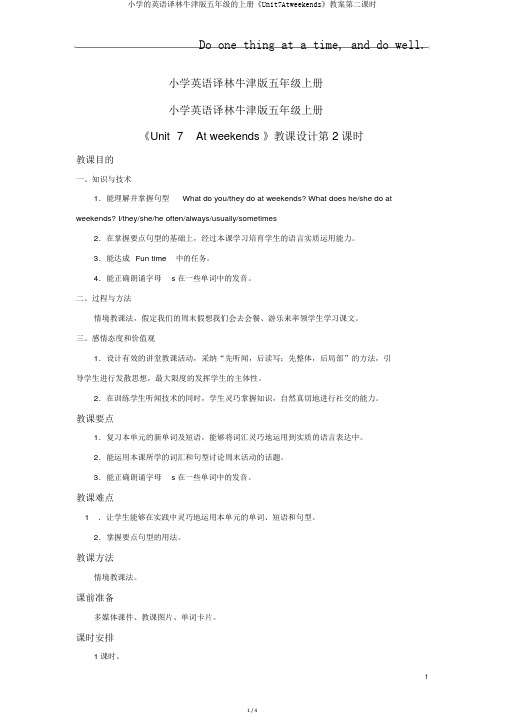
Do one thing at a time, and do well.小学英语译林牛津版五年级上册小学英语译林牛津版五年级上册《Unit 7 At weekends 》教课设计第 2 课时教课目的一、知识与技术1.能理解并掌握句型What do you/they do at weekends? What does he/she do at weekends? I/they/she/he often/always/usually/sometimes2.在掌握要点句型的基础上,经过本课学习培育学生的语言实质运用能力。
3.能达成Fun time中的任务。
4.能正确朗诵字母s 在一些单词中的发音。
二、过程与方法情境教课法,假定我们的周末假想我们会去会餐、游乐来率领学生学习课文。
三、感情态度和价值观1.设计有效的讲堂教课活动,采纳“先听闻,后读写;先整体,后局部”的方法,引导学生进行发散思想,最大限度的发挥学生的主体性。
2.在训练学生听闻技术的同时,学生灵巧掌握知识,自然真切地进行社交的能力。
教课要点1.复习本单元的新单词及短语,能够将词汇灵巧地运用到实质的语言表达中。
2.能运用本课所学的词汇和句型讨论周末活动的话题。
3.能正确朗诵字母s 在一些单词中的发音。
教课难点1.让学生能够在实践中灵巧地运用本单元的单词、短语和句型。
2.掌握要点句型的用法。
教课方法情境教课法。
课前准备多媒体课件、教课图片、单词卡片。
课时安排1课时。
教课过程一、导入新课Step1. Warming up.(热身活动)1.Sing an English song.2.Free talk.Step 2. Presentation(新课表现)游戏:摘果实。
1. 教师把词组:“ at weekends, chat on the Internet,fly a kite, go to the cinema, have a picnic, very much”以及句子“What do you/they do at weekends? What does he/she do at weekends?”“ I/they/she/he often/usually/always/sometimes”用卡片的形式贴在黑板上。
小学英语译林牛津版五年级上册《Unit7Atweekends》课件第一课时

新课学习
I always go to the cinema at weekends.
新课学习
We sometimes have a picnic at weekends.
新课导入
Ask and answer:
A: What do you/they do at the weekends?
B: I /they often/usually…
精品课 清风制作
译林版小学英语五年级上册
Unit 7
Lesseon 1
朗读本课单词三遍,使用“学乐师生”APP录音, 然后与全班同学分享。
新课学习
At weekends
新课学习
I often go out for dinner and play on weekends. What will you do on the weekend?
你们周末会做些什么呢?
新课学习 What will we do on weekends?
新课学习
chat on the Internet
I usually chat with my e-friend on the Internet.
新课学习
I often fly a kite at weekends.
家庭作业
1.Copy the new words four times.
2.Listen ,read and recite the story time.
3.Talk about your weekends with your classmates after class .
The En
d
A: What does she /he do at the weekends?
【精编】牛津译林苏教版五年级上册Unit7 At weekends-cartoon time

Watch and answer
Who are they?
Where is Billy ?
What do Bobby and Sam like doing ?
What does Billy like doing ?
Watch and answer
Watch and answer
Who are they?
It is spring. Sam and Bobby often play basketball.
Listen and repeat Let’s go swimming, Billy!
No. I don’t like swimming.
Summer comes. Sam and Bobby often go swimming.
主语是三单,动词要用第三人称单数
visits goes
flies
has
chats does
dances watches
skates
动词变为“三单”时:
1.+ s 2.+ es 3.将y改为ies, 4.特殊的单独记。
Let’s find
语法点拨: 1.在疑问句中,当主语是第三人称单数时用助动词 does,当主语是其他人称时用do,后面的动词用原形。 2.在陈述句中,当主语是第三人称单数时,动词要变 成三单形式;主语是其他人称时动词使用原形。
They're Sam,Bobby and Billy.
Where is Billy ?
He's at home.
What do Bobby and Sam like doing ?
They like playing basketball.
五年级上册英语教案Unit7Atweekends译林版
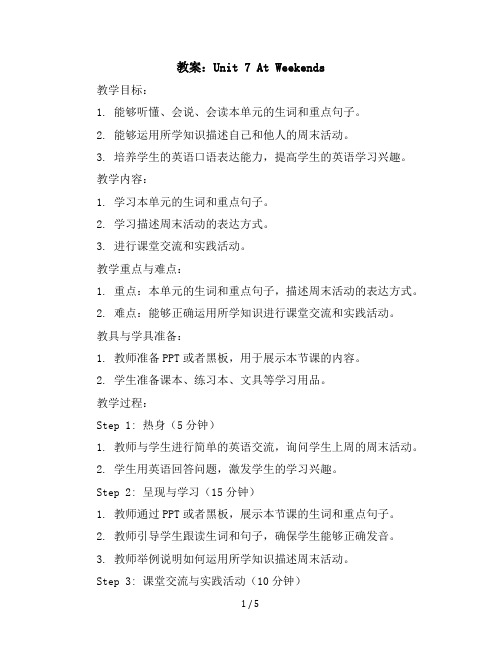
教案:Unit 7 At Weekends教学目标:1. 能够听懂、会说、会读本单元的生词和重点句子。
2. 能够运用所学知识描述自己和他人的周末活动。
3. 培养学生的英语口语表达能力,提高学生的英语学习兴趣。
教学内容:1. 学习本单元的生词和重点句子。
2. 学习描述周末活动的表达方式。
3. 进行课堂交流和实践活动。
教学重点与难点:1. 重点:本单元的生词和重点句子,描述周末活动的表达方式。
2. 难点:能够正确运用所学知识进行课堂交流和实践活动。
教具与学具准备:1. 教师准备PPT或者黑板,用于展示本节课的内容。
2. 学生准备课本、练习本、文具等学习用品。
教学过程:Step 1: 热身(5分钟)1. 教师与学生进行简单的英语交流,询问学生上周的周末活动。
2. 学生用英语回答问题,激发学生的学习兴趣。
Step 2: 呈现与学习(15分钟)1. 教师通过PPT或者黑板,展示本节课的生词和重点句子。
2. 教师引导学生跟读生词和句子,确保学生能够正确发音。
3. 教师举例说明如何运用所学知识描述周末活动。
Step 3: 课堂交流与实践活动(10分钟)1. 教师组织学生进行小组活动,学生互相询问周末活动,并用英语进行交流。
2. 教师选取几位学生进行课堂展示,分享他们的周末活动。
3. 教师给予评价和指导,帮助学生提高口语表达能力。
Step 4: 作业布置(5分钟)1. 教师布置作业,要求学生运用所学知识,写一篇关于自己周末活动的短文。
板书设计:1. 板书本节课的“Unit 7 At Weekends”。
2. 板书生词和重点句子,方便学生复习和巩固。
作业设计:1. 作业要求学生运用所学知识,写一篇关于自己周末活动的短文。
2. 作业要求学生正确拼写单词,正确使用语法,句子通顺。
课后反思:1. 教师对本节课的教学效果进行反思,找出优点和不足之处。
2. 教师根据学生的课堂表现和作业完成情况,调整教学策略,为下一节课做好准备。
最新译林牛津版小学英语五年级上册《Unit7Atweekends》Howwasyourw

How was your weekend?
男:Nancy今天我们来谈论一下有关周末的话题吧。
女:How was your weekend?
男:我的朋友们,你的周末过得怎么样啊?
女:Victor, this is just asking about someone's weekend, what they did, or whether it was good or bad.
男:这个问题就是问别人周末过的怎么样,大家都知道周末是非常relaxed 的days。
女:Now, on Friday afternoon, you could say, "Have a good weekend," instead of saying goodbye.
男:在周五的晚上跟别人打招呼的时候你就可以说“Have a good weekend”,不要说什么Goodbye的,真不好听。
女:That's only for Friday.
男:当然这个句子一定要在星期五晚上才可以用哦!
女:Ok, so how was your weekend?
男:How was your weekend?
女:Ok, that's all for today.
男:Ok, bye bye.
女:Bye bye.。
牛津译林版-英语-五上-Unit 7 At weekends 第一课时Story time.(教案)

Read the word.
生说出消失图片的单词。
排列单词
开汽车的形式学习,学生乐于参与。通过把单词和图片对应的连在一起,还有猜谜游戏,利于学生记忆单词。
锻炼学生的观察能力,有助于学生对单词的记忆。
操练单词,猜谜游戏,参与度广,很多单词都可以练习的到。
3.Story.
(1)Mike and Su Hai are talking about weekends.
难点
句型What do you do at weekends?
I…
What does she/he do at weekends?
She/He …的运用。
学法
自主学习,合作交流
教法
自主合作探究小组教学
教学过程
教学环节
教师活动
学生活动
设计意图
导入新课
Greeting &Warm up
1. Greeting
2.Mike doesn’t care about his grandparents
Because he doesn’t often visit his grandparents
3.Mike and Liu Tao don’t like sports.
4.Helen has dancing lessons at weekends.
能用句型What do you do at weekends?
I…
What does she/he do at weekends?
She/He …
重点
单词chaton theInternet, fly a kite, have a picnic,go to the cinema等单词的发音和具体运用。
牛津译林版-英语-五年级上册-Unit 7 At weekends.教案
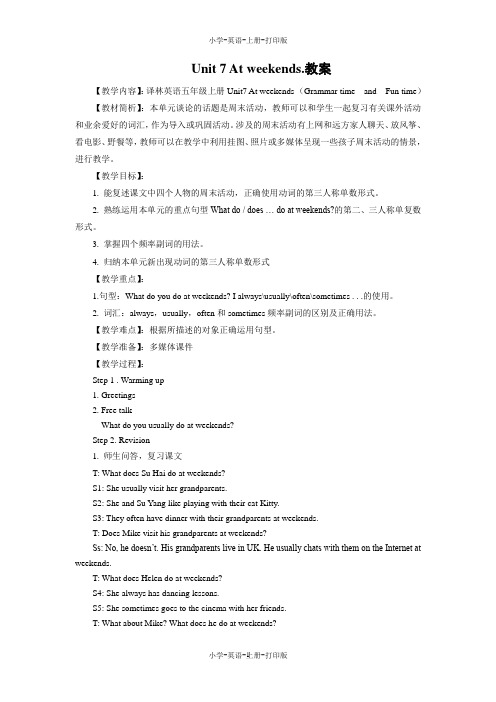
Unit 7 At weekends.教案【教学内容】:译林英语五年级上册Unit7 At weekends (Grammar time and Fun time)【教材简析】:本单元谈论的话题是周末活动,教师可以和学生一起复习有关课外活动和业余爱好的词汇,作为导入或巩固活动。
涉及的周末活动有上网和远方家人聊天、放风筝、看电影、野餐等,教师可以在教学中利用挂图、照片或多媒体呈现一些孩子周末活动的情景,进行教学。
【教学目标】:1. 能复述课文中四个人物的周末活动,正确使用动词的第三人称单数形式。
2. 熟练运用本单元的重点句型What do / does … do at weekends?的第二、三人称单复数形式。
3. 掌握四个频率副词的用法。
4. 归纳本单元新出现动词的第三人称单数形式【教学重点】:1.句型:What do you do at weekends? I always\usually\often\sometimes . . .的使用。
2. 词汇:always,usually,often和sometimes频率副词的区别及正确用法。
【教学难点】:根据所描述的对象正确运用句型。
【教学准备】:多媒体课件【教学过程】:Step 1 . Warming up1. Greetings2. Free talkWhat do you usually do at weekends?Step 2. Revision1. 师生问答,复习课文T: What does Su Hai do at weekends?S1: She usually visit her grandparents.S2: She and Su Yang like playing with their cat Kitty.S3: They often have dinner with their grandparents at weekends.T: Does Mike visit his grandparents at weekends?Ss: No, he doesn’t. His grandparents live in UK. He usually chats with them on the Internet at weekends.T: What does Helen do at weekends?S4: She always has dancing lessons.S5: She sometimes goes to the cinema with her friends.T: What about Mike? What does he do at weekends?S6: He usually plays football with Liu Tao.S7: He sometimes goes to the park with his family.S8: They usually fly a kite and have a picnic there.2. 复述课文中四个人物的周末活动。
译林牛津英语五年级上必刷题U7At weekends

班级_________ 姓名__________ 一根据所给单词的适当形式填空1. ---What ______Jack_______(do) at weekends?---He sometimes _______(go) to the cinema.2.Her parents usually______(fly)a kite and (have)____a picnic.3.My sister often _______(watch) films and _____(draw) pictures on Sundays.4Billy_______ (not play) basketball with______(he) friends .5Nancy has a _________(dance)lesson every week.6They like _______(chat) with _____(we) on the Internet.7Su Hai and Su Yang always_____ (visit) their uncle and aunts.8He likes_________(story) and he likes______(dance).9Do you want to play with_____ (we)? No, I want to play with ____(they)cat Kitty.10She often____(fly) a kite on _____(Saturday).二根据课文内容回答问题1Do Su Hai and Su Yang visit their grandparents at weekends?__________________________2What do Mike’s family do in the park?_____________________________________3Does Helen always go to the cinema with her friends?________________________________4 Where do Mike’s grandparents live?_______________________________________5How does Mike chat with his grandparents?__________________________________三句型转换1. She often visits her grandparents at weekends.(改为否定句)She _______ _______ ______ her _______ at weekends.2. I usually play the piano in the evening. (划线部分提问)______ ______ ________ usually _________ in the evening?3.He is good at Chinese. (对划线部分提问)What _____ ________he______?4. Mike always draws pictures after class.(改为一般疑问句并作否定回答)________ Mike always _________ pictures after class?No, he _____, ______.5. usually, does, make, Wang Bing, his, with, snowmen, friends (?)(连词成句)_____________________________________________________________四首字母填空My n _____is John. I am t______ years old. I have a l___ of h_____. I like playing b_____ and f____ kites. I a__ like playing the p______ . On Saturdays, I o______ play w_____ my brother Tim. We a_____ go to the park together. On S_______, we v___ our g_______. We always have d______ with them. And I have a good e-____. His name is Jerry. I u_____ c_____ with him on the I______. S____ we meet each other and have a p____.一辨音()1.A. has B. works C. this D. send( ) 2. A. his B. visit C. skate D. music( ) 3. Aoften B.always C.lot Dstocking( ) 4. A.many B. family C. rabbit D. chat( ) 5. A. visit B. weekends C. film D. winter二根据实际情况回答问题1What do you do at weekends? _____________________________________2Do your parents often visit your grandparents? _____________________________________3How often do you read storybooks? _____________________________________4Are you good at flying kites? _____________________________________5Does your e-friend always chat with you on the Internet?_________________________6Where is your classroom?_________________________________7What’s in your schoolbag?____________________________________三完成句子1. 你通常干什么?我通常去看电影。
牛津译林版五年级英语上册Unit 7 At weekends storytime优课件

Mike usually chats… Sometimes he … Su Hai and Su Yang usually… They often…
Helen always … Sometimes she…
read books
draw pictures watch films chat on the Internet
Unit 7 At weekends
Story time
I can read this story. I can retell this story. I can try to talk about the weekends.
Let’s learn
We usually … on weekdays.
always
At weekends
usually
often
sometimes
IV. Look and write
What do they do at weekends?
Tips: 1.小组内读课文并讨论,完成练习。 2.红色花瓣带领组员选择一种方式汇报。
IV. Look and write
play football
chat with my grandparents
fly a kite
have a picnic
IV. Look and write
have dancing lessons go to the cinema
IV. Look and write
visit our grandparents play with their cat often have dinner
I. Watch and answer
仔细看,思考他们在谈论谁的周末?
牛津译林版小学英语五年级上册Unit7 At weekends(第一课时)
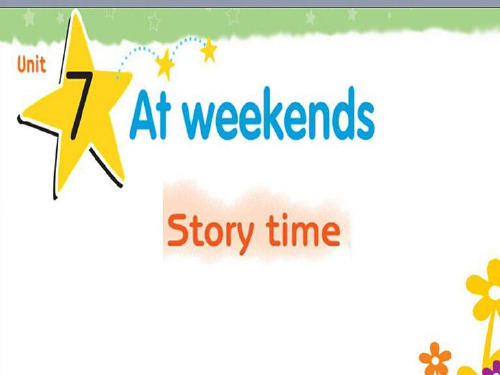
Let’s say
What do you usually do at weekends?
你周末通常干什么?
I usually ···
Let’s learn
My weekends
I always read books at weekends . 总是 在网上聊天
I usually c_h__a_t_o_n__t_h_e__I_n_t_e_r_n_e_t_at home.
通常
I often w__a_t_c_h__fi_lm__s_ with my friends . 经常
7 13 14 20 20 27
28
有时
I sohmaveetiampeicsnihcave a picnic at w野e餐ekends.
Let’s learn
通常
I ucchshauatatlloyonnctthhhaeetIInontnteerrtnnheeett Inc在the网arinr上aet聊t 天at weekends.
Sun Sat 6
经常
I ogoftteonthegocinteomtahe cinema at weekends.
(分角色读)
Story time
V. Look and write
•看图,完成课本70页练习。
•What do they do at weekends?
Let’s check
play football
chat with my grandparents
fly a kite
牛津译林英语五上《Unit 7 At weekendsC》[教案]【市级】优质课
![牛津译林英语五上《Unit 7 At weekendsC》[教案]【市级】优质课](https://img.taocdn.com/s3/m/fc55f659227916888486d7c8.png)
教学目标1.能正确理解、朗读Cartoon time中的故事,能读懂其中的趣味之处。
2.能在教师的指导下表演和复述故事。
3.了解字母s在单词中的读音。
4.了解英美人和中国人喜爱的不同的体育运动。
5.了解中西方文化差异,帮助学生拓展视野,了解世界的同时加深对中华民族优秀传统文化的认识和热爱。
2学情分析学生在Story time中已学习了本单元的话题--周末活动,能够谈论关于自己的周末活动,能够正确使用句型:What do you do at weekends?I always/usually/often/sometimes... 进行交谈,但主语变成第三人称单数时,肯定句中动词往往会忘记加“s”,特殊疑问句中任然用"do"而不用“does”。
3重点难点1.能正确理解、朗读Cartoon time中的故事。
2.能表演和复述故事。
4教学过程4.1 第一学时4.1.1教学目标1.能正确理解、朗读Cartoon time中的故事,能读懂其中的趣味之处。
2.能在教师的指导下表演和复述故事。
3.了解中国流行的体育运动项目,鼓励学生在周末时参加一些有益的活动,保持身体健康。
4.1.2学时重点1.能正确理解、朗读Cartoon time中的故事。
2.能表演和复述故事。
4.1.3学时难点1.能表演故事。
2.能根据提示复述故事。
4.1.4教学活动活动1【导入】Activity One:Warming up and leading in1. Look and sayT: Last lesson, we talked about our weekends, do you still remember?Look at the pictures. Please say quickly and loudly.2. Ask and answerA: We can do a lot of things at weekends. What do you do at weekends?B: I always/usually/often/sometimes …T: What do you do at weekends?S1: I always …S2: I usually …,sometimes I …3. Look and guessA: What does she/he do at weekends?B: He/She always/usually/often/sometimes …T: What does the boy/ g irl do at weekends? Let’s guess.Work in pairs, one ask, one answer!活动2【讲授】Activity two:Presentation and practice1. Watch and answer:What does Billy do at weekends?T: You are really good at guessing. What does Billy do at weekends?Can you guess? OK, let’s watch the cartoon, then answer the question.2. Read and completeT: Now open your books at page74, read picture 2、3、4 loudly, then complete the tableand underline the key sentences.3. Read and thinkT: Can Billy go out for a picnic?S: No.T: Why can’t Billy have a picnic?S: Because he is too fat. He can’t get out.4. Read after the tapeT: Let’s follow the tape and pay attention the pronunciation and intonation.5. Act in rolesT: Let’s act in roles in groups.活动3【活动】Activity three:Consolidation1. Retell the storyT: Look at the pictures. Can you retell the story?T: Today, we konw Billy likes... (point to the blackboard and retell the storytogether)2. Give some adviceT: Billy is too fat. Can you give him some advice? Discuss in groups.S: Don’t eat a lot.S2: Do more exercise.S3: Go swimming.S4: Play basketball…3. Enjoy some pictures of sportsT: This is my advice: Life lies movement, we should do more sports.Let’s know some popular sports in China.T: Boys and girls, come out and do some exercise this coming National Day!活动4【作业】Homework1. Read the cartoon and retell it.2. Plan your weekends with your parents.。
译林版五年级上学期Unit 7 At Weekends
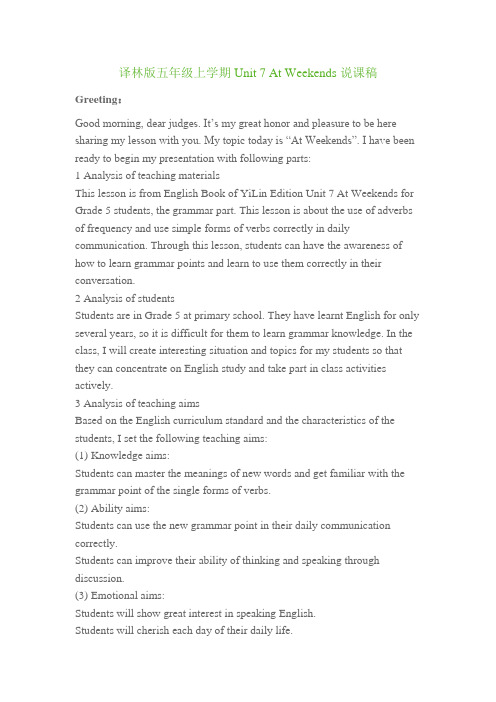
译林版五年级上学期Unit 7 At Weekends说课稿Greeting:Good morning, dear judges. It’s my great honor and pleasure to be here sharing my lesson with you. My topic today is “At Weekends”. I have been ready to begin my presentation with following parts:1 Analysis of teaching materialsThis lesson is from English Book of YiLin Edition Unit 7 At Weekends for Grade 5 students, the grammar part. This lesson is about the use of adverbs of frequency and use simple forms of verbs correctly in daily communication. Through this lesson, students can have the awareness of how to learn grammar points and learn to use them correctly in their conversation.2 Analysis of studentsStudents are in Grade 5 at primary school. They have learnt English for only several years, so it is difficult for them to learn grammar knowledge. In the class, I will create interesting situation and topics for my students so that they can concentrate on English study and take part in class activities actively.3 Analysis of teaching aimsBased on the English curriculum standard and the characteristics of the students, I set the following teaching aims:(1) Knowledge aims:Students can master the meanings of new words and get familiar with the grammar point of the single forms of verbs.(2) Ability aims:Students can use the new grammar point in their daily communication correctly.Students can improve their ability of thinking and speaking through discussion.(3) Emotional aims:Students will show great interest in speaking English.Students will cherish each day of their daily life.4 Analysis of teaching key points and difficult points:Key points:Students can know how to change the root form of a verb into a single form. Students can improve their speaking ability.Difficult point:Students use the grammar point to talk about their daily life correctly.5 Analysis of teaching methods and learning methodsTo help students achieve the teaching aims much better and easier, I’ll mainly use “Task-based” and “Communicative” teaching methods. For students, they will use autonomous learning method, and they will learn to communicate with people, and become the real host of the class.6 Analysis of teaching aidsIn order to catch students’ attention, I prepare multi-media and pictures7 Analysis of teaching procedures:This is the most important part in this design, it can be divided into following steps:Step 1 Lead-inAfter greeting students, I will describe my daily life with sentences such as I have breakfast everyday, I wash my clothes 2 times a week and so on. Then ask students to talk about something about their own daily life. This aims to arouse students’ interest and lead to the topic of this lesson correctly.Step 2 Presentation(1) After the description of my and students’ daily life, I can tell students the meanings of some adverbs of frequency which can be illustrated by drawing stars on the blackboard. (Use 5 red stars stand for always, 4 red stars stand for usually, and etc.)(2) After the presentation of these adverbs of frequency, show students a picture which is about some situation of daily life and I will ask students what do you/ they do at weekends? I will guide my students to answer the questions and write down the answers on the blackboard: such as I often have dinner with my grandparents. She always has dancing lessons. He sometimes goes to the park. Let students realize the simple forms of verbs and the regular forms of verbs.(3) Then write several verbs on the left side of the blackboard and write the simple forms of them on the right side of the blackboard. Let students discuss and find the rules about how to change a regular form of a verb into the simple form.Through this step, students can improve their ability of thinking and summary through discussion. Students can also master the new grammar point better through autonomous study and teacher’s guidance.Step 3 Practice(1) Show students several other words and let students say the simple forms of these verbs.(2) Students will do an ask and answer game which describes the picture showed before with the new sentence structure: what do they/does he do at weekends? They/He often/usually/always…… This step aims to help students have a better understanding of the new grammar point and can use them correctly.Step 4 ProductionRole play: ask students use the new sentence structure to talk about what do they do on weekdays and answer it with adverbs of frequency. Invite 2 groups to have a presentation and give them some positive evaluation according to their performance.Do a survey: Four students in a group, one acts as a reporter and reports the result by using the sentence pattern “someone usually/always/seldom…”These activities create similar situation for students which can arouse their curiosity of speaking. Besides it can also consolidate what they have learned.Step 5 Summary and HomeworkI will invite one student to summarize what we have learned today and give an evaluation. The homework is to ask students to ask their family members what do they do at weekends and write down their answers. Besides, they shall share their reports with other students the next class.8 Blackboard Design:At last I would talk about my blackboard design. The main information is demonstrated on the blackboard and its logic is clear.。
【优质】小学英语译林牛津版五年级上册《Atweekends》优质公开课教案

【优质】小学英语译林牛津版五年级上册《Atweekends》优质公开课教案《At weekends》教案课题Unit7 At weekends教学目标1. Learn the vocabulary: rose, grow, get out.2. Learn the phonetic of the letter “s”.3. Learn the patterns: Let’s go …. He/She ……s/es ….4. Train Ss enjoy the great fun of this cartoon story.教学重点难点1. Learn the vocabulary: rose, grow, get out.2. Learn the phonetic of the letter “s”.3. Learn the patterns: Let’s go …. He/She ……s/es ….教学方法谈话教学法教学步骤教师活动学生活动Step1 Warming-up Greetings and free talk. Greetings and freetalk.Listen and write somesentences.Listen and write. Check the answers. Check the answers.Step2 Look at the pictures. Look at thePresentationpictures.Listen to the tape. Listen to the tape. Find the same letter “s”. Find the same letter“s”.Say the phonetic /z/ of theletter “s”.Say the phonetic/z/.Teach the new words:rose-roses, grow-growsLearn the new words:rose-roses,grow-growsRead the short text. Read the short text. Act the short text. Act the short text. Find the other words. Find the other words.Do some exercises. Do some exercises. Check the answers: Check the answers. T: Look at the pictures, whoare they?S: They’re Billy,Sam and Bobby.T: What are they doing? Watchthe cartoon, please.Watch the cartoon.Ask, answer and fill theforms:Ask, answer andfill.Billy-watch TV, eat a lot, don’t like playing。
牛津译林版(三年级起始) 五年级上册 Unit7 At weekends

What do you do at weekends, Su Hai? I usually visit my grandparents. Su Yang and I like playing with their cat Kitty very much. We often have dinner with our grandparents at weekends.
weekends
/dz/ Saturdays and Sundays
What do you do at weekends? I ... What does she/he do at weekends? She/He ...s/es…
当主语是第 三人称单数时, 动词别忘了用 三单形式哦!
What are they talking about?
Do you know?
你知道频率副词(always/ usually/often/sometimes)的区别吗? She usually visits her grandparents at weekends.
用星星来区分频率的高 低
She often has dinner with her grandparents.
Watch and answer
What are they talking about?
They are talking about their weekends .
Listen and circle.
发生的频率
听录音,圈出 SuHai周末活动的短语! 用来提问某动作或状态
How often?
What do they do at weekends?
Read and circle what they do at weekends. 阅读课文,在文中圈画出他们在周末所做的事情的短语!
- 1、下载文档前请自行甄别文档内容的完整性,平台不提供额外的编辑、内容补充、找答案等附加服务。
- 2、"仅部分预览"的文档,不可在线预览部分如存在完整性等问题,可反馈申请退款(可完整预览的文档不适用该条件!)。
- 3、如文档侵犯您的权益,请联系客服反馈,我们会尽快为您处理(人工客服工作时间:9:00-18:30)。
Unit 7 At the weekends 教案
教学设计1
教学目标:
新课程强调知识与技能,过程与方法,情感态度与价值三个角度的有机结合,本着这样的认识,我对本课设计了如下的教学目标:
1.情感目标: 通过活动,游戏,儿歌等形式让学生产生学习英语的兴趣,让学生在老师创设的氛围中敢于,乐于,善于开口讲英语,积极参与交流,树立学好英语的信心。
并通过谈论自己的周末生活,体会生活的美好,从而更加的热爱和珍惜现在的美好的生活。
2.认知目标:
(1)掌握对话中出现的词组,如chat on the Internet,fly a kite,go to the cinema,have a picnic等。
(2 ) 句型:What do you do at weekends? I often…
What does he /she do at weekends?
He / She often …
(3)能模仿对话的语音语调,理解并熟练的朗读对话,读音准确。
3.能力目标:
能运用所学的句型,结合对话中出现和以前学过的动词词组,用英语进行生活交际,了解同学和佳人的平时活动。
通过调查让学生体会合作的重要性,并能用所学的知识解决一些实际的问题。
教学重点:
学生能运用句型What do you do at weekends? What does he/ she do at weekends? 结合词组进行口语交际,注意动词第三人称单数的用法。
教学难点:
1. 单词picnic的发音以及其复数形式。
2. 第一人称到第三人称的转化。
3. 根据所学的知识完成有关的练习。
教学策略:
新课程强调从学生的学习兴趣,生活经验和认识水平出发,倡导体验,时间,参与,合作与交流的学习方式和任务型的教学途径达到发展学生对语言的综合运用能力。
为了达到教学目标,落实教学重点,难点,本堂课我借助多媒体复习以前学过的动词词组,借助一些事物,如塑封的蝴蝶等,激发学生的兴趣,同时也为下节课昆虫的教学打下基础。
在整个教学中,注意师生的互动,从唱,游戏,对话等活动完成本课的教学任务。
教学准备:
单词卡片,录音机,写好课题等。
教学过程:
Step1 Warming up
Sing a song: Hobbies.
(英语歌曲是提高学生英语学习兴趣和学习效率的有效方法之一。
这首活泼的歌曲既能感染学生,调动学生的情绪,歌词中的词组如:watch TV,grow flowers,take photos等又能为新课学习作铺垫,自然导入新课。
Step2 Revision
A. Free talk
T: What do you like? Do you like…?
S1: Yes, I do.
T: How about you?
S2: I like ….
(通过句型问答,形成一个学习英语的氛围。
更重要的为了复习以前学过的动词词组,为接下来的教学做好准备。
)
B. Play a game
Look at the pictures, say and do the actions together.
(培养学生的学习兴趣,调节课堂气氛,并从活动中体会动词词组的含义,既巩固又加深印象,为接下来的学习做好准备。
)
Step3 Presentation
T: I like watching TV, so I usually watch TV on Saturdays.
T: What do you usually do on Saturdays?
S1: I ….
T: What do you usually do on Sundays?
S2: I ….
(过度自然,以易带难,学生就更加容易接受。
)
B. Learn: weekend
Saturday + Sunday = weekend
on Saturdays + on Sundays = at the weekends
在学习weekend时,通过pen,ten,friend来帮助发音和记忆。
(通过归纳相同读音的单词引出新授单词,能使学生更快更好地掌握新知。
)
T: I often chat on the Internet at the weekends. What do you often do at the weekends?
S: (在教师的引导下应答)I often…at the weekends.
T: (出示often),教读often
Ss: often
T: I often chat on the Internet at the weekends.
What do you often do at the weekends?
S: I often…
Step4 Practice
A: Look at the pictures, then discuss in groups.
B: Ask and answer.
C: Say a rhyme.
How? How? What do you do at weekends?
Often. Often. I often watch cartoons.
How? How? What does he do at weekends?
Often. Often. He often plays the piano.
How? How? What does she do at weekends?
Often, often. She often goes shopping.
Sometimes, sometimes. Sometimes we play cards. Step5 Consolidation
Read Story time and make sentences by yourself. 家庭作业:
熟记本单元所学短语。
